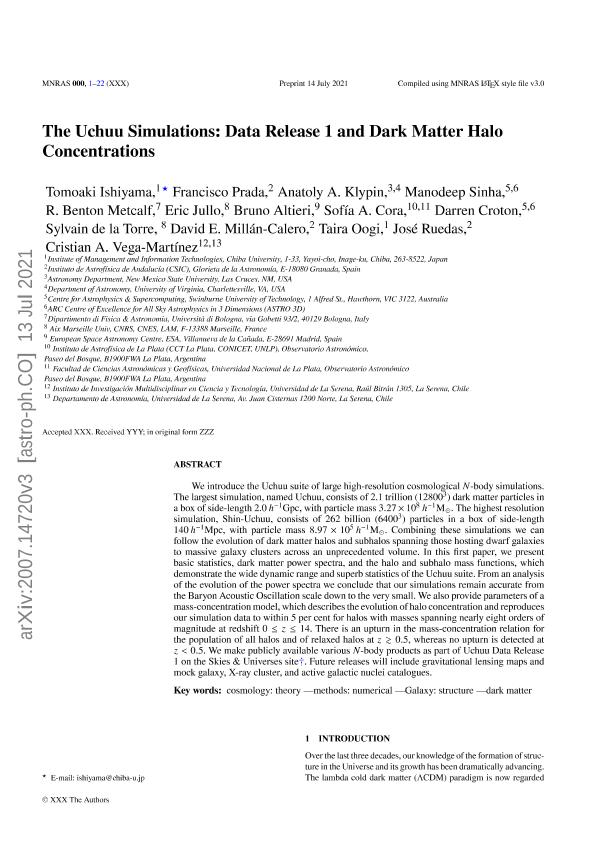Mostrar el registro sencillo del ítem
dc.contributor.author
Uzundag, Murat

dc.contributor.author
Vučković, Maja
dc.contributor.author
Németh, Péter
dc.contributor.author
Miller Bertolami, Marcelo Miguel

dc.contributor.author
Silvotti, Roberto
dc.contributor.author
Baran, Andrzej S.
dc.contributor.author
Telting, John H.
dc.contributor.author
Reed, Mike
dc.contributor.author
Shoaf, K. A.
dc.contributor.author
Østensen, Roy H.
dc.contributor.author
Sahoo, Sumanta K.
dc.date.available
2022-03-31T16:04:46Z
dc.date.issued
2021-07
dc.identifier.citation
Uzundag, Murat; Vučković, Maja; Németh, Péter; Miller Bertolami, Marcelo Miguel; Silvotti, Roberto; et al.; Asteroseismic analysis of variable hot subdwarf stars observed with TESS : I, the mean g-mode period spacings in hot subdwarf B stars; EDP Sciences; Astronomy and Astrophysics; 651; A121; 7-2021; 1-19
dc.identifier.issn
0004-6361
dc.identifier.uri
http://hdl.handle.net/11336/154128
dc.description.abstract
Context. We present photometric and spectroscopic analyses of gravity (g-mode) long-period pulsating hot subdwarf B (sdB) stars, also called V1093 Her stars, observed by the TESS space telescope in both 120 s short-cadence and 20 s ultra-short-cadence mode during the survey observation and the extended mission of the southern ecliptic hemisphere. Aims. We perform a detailed asteroseismic and spectroscopic analysis of five pulsating sdB stars observed with TESS aiming at the global comparison of the observations with the model predictions based on our stellar evolution computations coupled with the adiabatic pulsation computations. Methods. We process and analyze TESS observations of long-period pulsating hot subdwarf B stars. We perform standard prewhitening techniques on the datasets to extract the pulsation periods from the TESS light curves. We apply standard seismic tools for mode identification, including asymptotic period spacings and rotational frequency multiplets. Based on the values obtained from Kolmogorov-Smirnov and Inverse Variance tests, we search for a constant period spacing for dipole (l = 1) and quadrupole (l = 2) modes. We calculate the mean period spacing for l = 1 and l = 2 modes and estimate the errors by means of a statistical resampling analysis. For all stars, atmospheric parameters were derived by fitting synthetic spectra to the newly obtained low-resolution spectra. We have computed stellar evolution models using LPCODE stellar evolution code, and computed l = 1 g-mode frequencies with the adiabatic non-radial pulsation code LP-PUL. Derived observational mean period spacings are then compared to the mean period spacings from detailed stellar evolution computations coupled with the adiabatic pulsation computations of g-modes. Results. We detect 73 frequencies, most of which are identified as dipole and quadrupole g-modes with periods spanning from ∼ 3 000 s to ∼ 14 500 s. The derived mean period spacing of dipole modes is concentrated in a narrow region ranging from 251 s to 256 s, while the mean period spacing for quadrupole modes spans from 145 s to 154 s. The atmospheric parameters derived from spectroscopic data are typical of long-period pulsating sdB stars with the effective temperature ranging from 23 700 K to 27 600 K and surface gravity spanning from 5.3 dex to 5.5 dex. In agreement with the expectations from theoretical arguments and previous asteroseismological works, we find that the mean period spacings obtained for models with small convective cores, as predicted by a pure Schwarzschild criterion, are incompatible with the observations. We find that models with a standard/modest convective boundary mixing at the boundary of the convective core are in better agreement with the observed mean period spacings and are therefore more realistic. Conclusions. Using high-quality space-based photometry collected by the TESS mission coupled with low-resolution spectroscopy from the ground, we have provided a global comparison of the observations with model predictions by means of a robust indicator such as the mean period spacing. All five objects that we analyze in this work show a remarkable homogeneity in both seismic and spectroscopic properties.
dc.format
application/pdf
dc.language.iso
eng
dc.publisher
EDP Sciences

dc.rights
info:eu-repo/semantics/openAccess
dc.rights.uri
https://creativecommons.org/licenses/by-nc-sa/2.5/ar/
dc.subject
asteroseismology
dc.subject.classification
Astronomía

dc.subject.classification
Ciencias Físicas

dc.subject.classification
CIENCIAS NATURALES Y EXACTAS

dc.title
Asteroseismic analysis of variable hot subdwarf stars observed with TESS : I, the mean g-mode period spacings in hot subdwarf B stars
dc.type
info:eu-repo/semantics/article
dc.type
info:ar-repo/semantics/artículo
dc.type
info:eu-repo/semantics/publishedVersion
dc.date.updated
2022-02-04T13:31:04Z
dc.journal.volume
651
dc.journal.number
A121
dc.journal.pagination
1-19
dc.journal.pais
Francia

dc.journal.ciudad
Paris
dc.description.fil
Fil: Uzundag, Murat. Universidad de Valparaíso; Chile
dc.description.fil
Fil: Vučković, Maja. Universidad de Valparaíso; Chile
dc.description.fil
Fil: Németh, Péter. Astronomical Institute Of The Czech Academy Of Science; República Checa
dc.description.fil
Fil: Miller Bertolami, Marcelo Miguel. Consejo Nacional de Investigaciones Científicas y Técnicas. Centro Científico Tecnológico Conicet - La Plata. Instituto de Astrofísica La Plata. Universidad Nacional de La Plata. Facultad de Ciencias Astronómicas y Geofísicas. Instituto de Astrofísica La Plata; Argentina
dc.description.fil
Fil: Silvotti, Roberto. Osservatorio Astrofisico di Torino; Italia
dc.description.fil
Fil: Baran, Andrzej S.. Pedagogical University of Cracow; Polonia
dc.description.fil
Fil: Telting, John H.. Aarhus University; Dinamarca
dc.description.fil
Fil: Reed, Mike. Missouri State University; Estados Unidos
dc.description.fil
Fil: Shoaf, K. A.. Missouri State University; Estados Unidos
dc.description.fil
Fil: Østensen, Roy H.. Missouri State University; Estados Unidos
dc.description.fil
Fil: Sahoo, Sumanta K.. Pedagogical University of Cracow; Polonia
dc.journal.title
Astronomy and Astrophysics

dc.relation.alternativeid
info:eu-repo/semantics/altIdentifier/url/https://www.aanda.org/10.1051/0004-6361/202140961
dc.relation.alternativeid
info:eu-repo/semantics/altIdentifier/doi/http://dx.doi.org/10.1051/0004-6361/202140961
Archivos asociados
